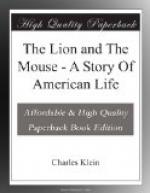That is why Jefferson had resolved to strike out for himself. He had warded off the golden yoke which his father proposed to put on his shoulders, declining the lucrative position made for him in the Empire Trading Company, and he had gone so far as to refuse also the private income his father offered to settle on him. He would earn his own living. A man who has his bread buttered for him seldom accomplishes anything he had said, and while his father had appeared to be angry at this open opposition to his will, he was secretly pleased at his son’s grit. Jefferson was thoroughly in earnest. If needs be, he would forego the great fortune that awaited him rather than be forced into questionable business methods against which his whole manhood revolted.
Jefferson Ryder felt strongly about these matters, and gave them more thought than would be expected of most young men with his opportunities. In fact, he was unusually serious for his age. He was not yet thirty, but he had done a great deal of reading, and he took a keen interest in all the political and sociological questions of the hour. In personal appearance, he was the type of man that both men and women like—tall and athletic looking, with smooth face and clean-cut features. He had the steel-blue eyes and the fighting jaw of his father, and when he smiled he displayed two even rows of very white teeth. He was popular with men, being manly, frank and cordial in his relations with them, and women admired him greatly, although they were somewhat intimidated by his grave and serious manner. The truth was that he was rather diffident with women, largely owing to lack of experience with them.
He had never felt the slightest inclination for business. He had the artistic temperament strongly developed, and his personal tastes had little in common with Wall Street and its feverish stock manipulating. When he was younger, he had dreamed of a literary or art career. At one time he had even thought of going on the stage. But it was to art that he turned finally. From an early age he had shown considerable skill as a draughtsman, and later a two years’ course at the Academy of Design convinced him that this was his true vocation. He had begun by illustrating for the book publishers and for the magazines, meeting at first with the usual rebuffs and disappointments, but, refusing to be discouraged, he had kept on and soon the tide turned. His drawings began to be accepted. They appeared first in one magazine, then in another, until one day, to his great joy, he received an order from an important firm of publishers for six washdrawings to be used in illustrating a famous novel. This was the beginning of his real success. His illustrations were talked about almost as much as the book, and from that time on everything was easy. He was in great demand by the publishers, and very soon the young artist, who had begun his career of independence on nothing a year so to speak, found himself in a handsomely appointed




